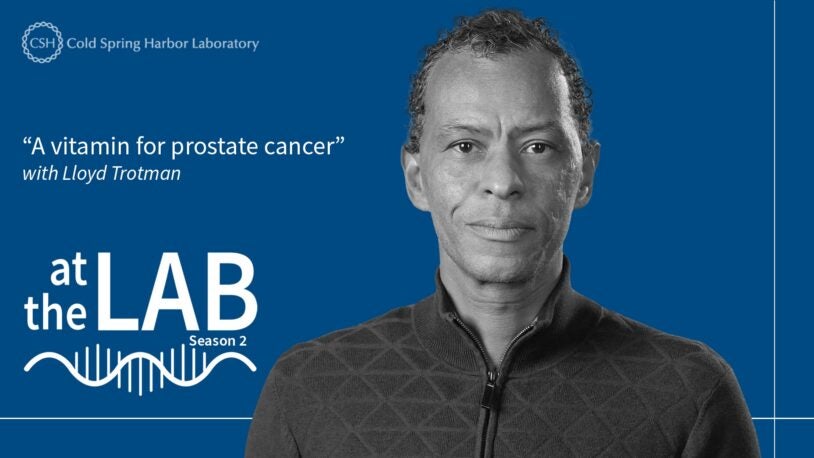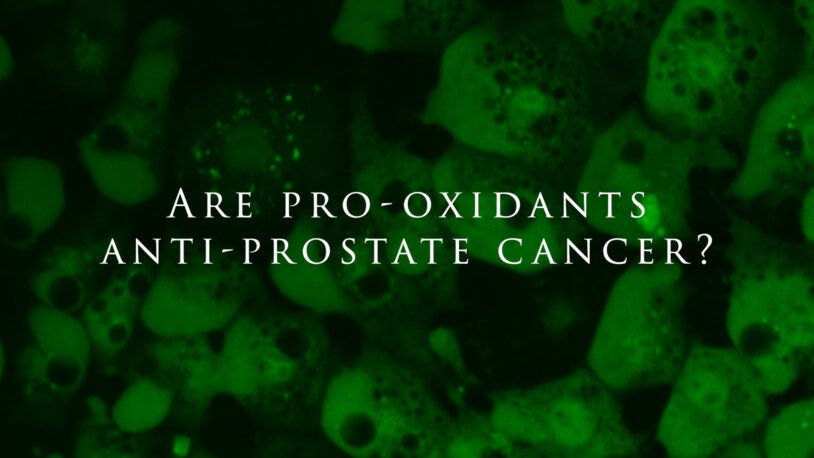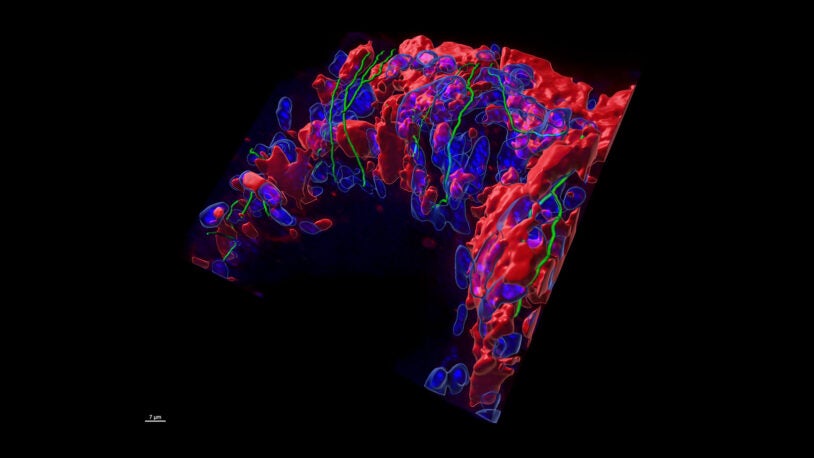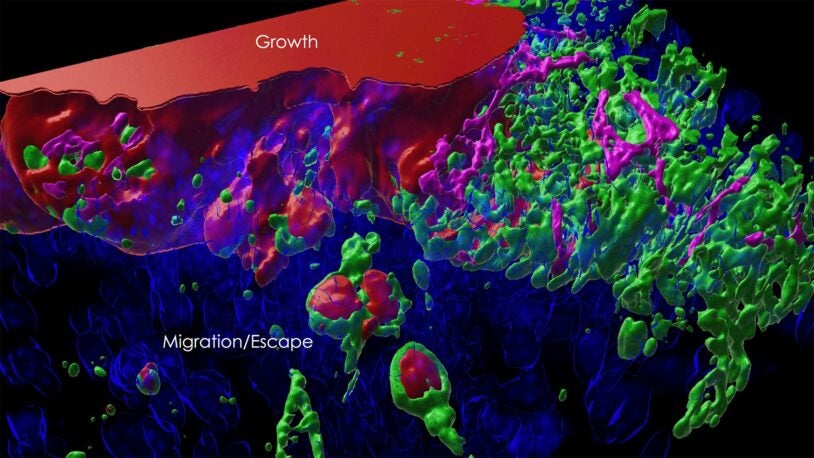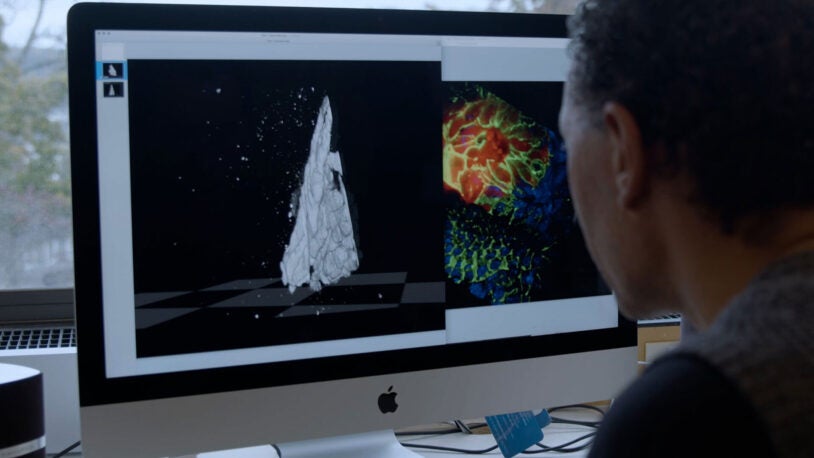
Lloyd Trotman
Professor
Cancer Center Deputy Director of Education
Ph.D., University of Zurich, 2001
trotman@cshl.edu | 516-367-5054
We pioneered generation of a unique genetic mouse model for therapy and analysis of metastatic prostate cancer. Recently, we developed 3-dimensional whole organ imaging technology that allows us to visualize cancer and metastatic progression in its native environment and at single cell resolution. Now, we use this platform to understand the role of nerves in tumor metastasis, and to develop novel therapeutic interventions against lethal disease.
Understanding Metastasis–Designing models of lethal cancer
The Trotman lab have developed the RapidCaP model system to study metastatic prostate cancer in vivo. This approach allows them to visualize and probe metastasis biology in the fully native and immune competent setting. They combine this with 3D whole organ imaging at single cell resolution to define the stepwise progression from primary tumor escape to colonization of metastatic sites such as bone, liver and lung.
The Neuro-Metastasis Interface
A major challenge in metastasis research is the identification of factors that control progression of non life-threatening tumors to lethal metastatic disease. In spite of much knowledge on the role of tumor neuron interactions in primary prostate cancer, the role of neurons in metastatic prostate cancer remains to be defined. They use their whole organ imaging platform on metastatic tumors to map and manipulate interactions between the peripheral nervous system and metastatic lesions in collaboration with neuroscientists at CSHL.
Therapy of Lethal Prostate Cancer
They use the RapidCaP model to understand evolution of metastasis and therapy resistance in order to advance the 70 year old standard of care, anti-hormonal therapy, which is not curative. They combine three cutting edge approaches to test novel therapeutic concepts, in vivo: Single cell analysis of metastatic therapy resistance, dietary control of prostate cancer progression, discovery of therapeutic targets in genome wide screens.
2022 Member, AACR Science Education and Career Advancement Committee
2021 Editorial Board member, The Journal of Cell Biology, Rockefeller Press, NY
2020 Editorial Advisory Board member, The EMBO Journal
2014 Pershing Square Sohn Prize
2014 American Cancer Society Scholar
2008 V Foundation Scholar
2007 Rita Allen Foundation Scholar
2006 ASCB Merton R. Bernfield Memorial Award
From finance to restaurateur to men’s health advocate
April 24, 2025
At just 48, Tom Milana was diagnosed with prostate cancer. 10 years later he is making a big impact on prostate cancer research and men’s health.
At the Lab: A vitamin for prostate cancer
April 8, 2025
For the Season 2 premiere of our podcast, we sit down with CSHL Professor Lloyd Trotman to discuss what could be a major breakthrough in men’s health.
Are pro-oxidants anti-prostate cancer?
January 7, 2025
New research from CSHL Professor Lloyd Trotman offers men of all ages a look inside the possible future of prostate cancer treatment and prevention.
Vitamin K supplement slows prostate cancer in mice
October 24, 2024
The finding from CSHL Professor Lloyd Trotman and his team sets the stage for pilot studies in human prostate cancer patients.
Bite into this diet and disease quiz
July 5, 2023
Test your knowledge of how diet and nutrition affect health and disease with this short quiz.
Cancer has a lot of nerve
August 22, 2022
Tumors recruit the nervous system to help them spread. Scientists are looking for ways to stop it.
The prostate cancer cell that got away
November 16, 2021
Like finding a needle in a haystack, CSHL scientists can now track prostate cancer in mice from its single cell start and as it spreads.
CSHL Ph.D. program: Graduating class of 2021
August 22, 2021
The CSHL School of Biological Sciences awarded Ph.D. degrees to seven students this year, who describe some of their experiences.
CSHL Association holds its annual meeting
January 29, 2021
The Cold Spring Harbor Laboratory Association welcomes four new directors and thanks three retiring ones.
Cold Spring Harbor Laboratory: Science is hope
December 21, 2020
The Laboratory is a leading research center for genetics, cancer, plant biology, quantitative biology, and neuroscience.
All Publications
Fatty acid binding protein 5 inhibitors as novel anticancer agents against metastatic castration-resistant prostate cancer
May 2025 | Bioorganic and Medicinal Chemistry | 122:118136
Wang, Hehe; Zhu, Chuanzhou; Swamynathan, Manojit; Rajput, Shubhra; Jayanetti, Kalani; Rendina, Dominick; Takemura, Kathryn; Bogdan, Diane; Wang, Liqun; Rizzo, Robert; Kaczocha, Martin; Trotman, Lloyd; Bialkowska, Agnieszka; Ojima, Iwao;
Pleiotropic tumor suppressive functions of PTEN missense mutations during gliomagenesis
20 Dec 2024 | iScience | 27(12):111278
Jun, H; Paulo, J; Appleman, V; Yaron-Barir, T; Johnson, J; Yeo, A; Rogers, V; Kuang, S; Varma, H; Gygi, S; Trotman, L; Charest, A;
Dietary pro-oxidant therapy by a vitamin K precursor targets PI 3-kinase VPS34 function
25 Oct 2024 | Science | 386(6720):eadk9167
Swamynathan, Manojit; Kuang, Shan; Watrud, Kaitlin; Doherty, Mary; Gineste, Charlotte; Mathew, Grinu; Gong, Grace; Cox, Hilary; Cheng, Eileen; Reiss, David; Kendall, Jude; Ghosh, Diya; Reczek, Colleen; Zhao, Xiang; Herzka, Tali; Špokaitė, Saulė; Dessus, Antoine; Kim, Seung; Klingbeil, Olaf; Liu, Juan; Nowak, Dawid; Alsudani, Habeeb; Wee, Tse-Luen; Park, Youngkyu; Minicozzi, Francesca; Rivera, Keith; Almeida, Ana; Chang, Kenneth; Chakrabarty, Ram; Wilkinson, John; Gimotty, Phyllis; Diermeier, Sarah; Egeblad, Mikala; Vakoc, Christopher; Locasale, Jason; Chandel, Navdeep; Janowitz, Tobias; Hicks, James; Wigler, Michael; Pappin, Darryl; Williams, Roger; Cifani, Paolo; Tuveson, David; Laporte, Jocelyn; Trotman, Lloyd;
Next Directions in the Neuroscience of Cancers Arising outside the CNS
4 Apr 2024 | Cancer Discovery | 14(4):669-673
Amit, Moran; Anastasaki, Corina; Dantzer, Robert; Demir, Ihsan; Deneen, Benjamin; Dixon, Karen; Egeblad, Mikala; Gibson, Erin; Hervey-Jumper, Shawn; Hondermarck, Hubert; Magnon, Claire; Monje, Michelle; Na'ara, Shorook; Pan, Yuan; Repasky, Elizabeth; Scheff, Nicole; Sloan, Erica; Talbot, Sebastien; Tracey, Kevin; Trotman, Lloyd; Valiente, Manuel; Van Aelst, Linda; Venkataramani, Varun; Venkatesh, Humsa; Vermeer, Paola; Winkler, Frank; Wong, Richard; Gutmann, David; Borniger, Jeremy;
Retinoic acid receptor activation reprograms senescence response and enhances anti-tumor activity of natural killer cells
27 Feb 2024 | Cancer Cell | :S1535-6108(24)00048
Colucci, Manuel; Zumerle, Sara; Bressan, Silvia; Gianfanti, Federico; Troiani, Martina; Valdata, Aurora; D'Ambrosio, Mariantonietta; Pasquini, Emiliano; Varesi, Angelica; Cogo, Francesca; Mosole, Simone; Dongilli, Cristina; Desbats, Maria; Contu, Liliana; Revankdar, Ajinkya; Chen, Jingjing; Kalathur, Madhuri; Perciato, Maria; Basilotta, Rossella; Endre, Laczko; Schauer, Stefan; Othman, Alaa; Guccini, Ilaria; Saponaro, Miriam; Maraccani, Luisa; Bancaro, Nicolò; Lai, Ping; Liu, Lei; Pernigoni, Nicolò; Mele, Federico; Merler, Sara; Trotman, Lloyd; Guarda, Greta; Calì, Bianca; Montopoli, Monica; Alimonti, Andrea;
FABP5 Inhibition against PTEN-Mutant Therapy Resistant Prostate Cancer
2024 | Cancers | 16(1):60
Swamynathan, Manojit; Mathew, Grinu; Aziz, Andrei; Gordon, Chris; Hillowe, Andrew; Wang, Hehe; Jhaveri, Aashna; Kendall, Jude; Cox, Hilary; Giarrizzo, Michael; Azabdaftari, Gissou; Rizzo, Robert; Diermeier, Sarah; Ojima, Iwao; Bialkowska, Agnieszka; Kaczocha, Martin; Trotman, Lloyd;
Fatty acid binding protein 5 regulates docetaxel sensitivity in taxane-resistant prostate cancer cells
2023 | PLoS ONE | 18(10):e0292483
Hillowe, Andrew; Gordon, Chris; Wang, Liqun; Rizzo, Robert; Trotman, Lloyd; Ojima, Iwao; Bialkowska, Agnieszka; Kaczocha, Martin; Pizzo, Salvatore;
The Akt/mTOR and MNK/eIF4E pathways rewire the prostate cancer translatome to secrete HGF, SPP1 and BGN and recruit suppressive myeloid cells
Aug 2023 | Nature Cancer | 4(8):1102-1121
Brina, Daniela; Ponzoni, Adele; Troiani, Martina; Calì, Bianca; Pasquini, Emiliano; Attanasio, Giuseppe; Mosole, Simone; Mirenda, Michela; D'Ambrosio, Mariantonietta; Colucci, Manuel; Guccini, Ilaria; Revandkar, Ajinkya; Alajati, Abdullah; Tebaldi, Toma; Donzel, Deborah; Lauria, Fabio; Parhizgari, Nahjme; Valdata, Aurora; Maddalena, Martino; Calcinotto, Arianna; Bolis, Marco; Rinaldi, Andrea; Barry, Simon; Rüschoff, Jan; Sabbadin, Marianna; Sumanasuriya, Semini; Crespo, Mateus; Sharp, Adam; Yuan, Wei; Grinu, Mathew; Boyle, Alexandra; Miller, Cynthia; Trotman, Lloyd; Delaleu, Nicolas; Fassan, Matteo; Moch, Holger; Viero, Gabriella; de Bono, Johann; Alimonti, Andrea;
Internally Controlled and Dynamic Optical Measures of Functional Tumor Biology
4 Apr 2023 | Analytical Chemistry | 95(13):5661-5670
Chung, Taemoon; Garcia, Libia; Swamynathan, Manojit; Froeling, Fieke; Trotman, Lloyd; Tuveson, David; Lyons, Scott;
PP2A methylesterase PME-1 suppresses anoikis and is associated with therapy relapse of PTEN-deficient prostate cancers
3 Dec 2022 | Molecular Oncology
Aakula, Anna; Isomursu, Aleksi; Rupp, Christian; Erickson, Andrew; Gupta, Nikhil; Kauko, Otto; Shah, Pragya; Padzik, Artur; Pokharel, Yuba; Kaur, Amanpreet; Li, Song-Ping; Trotman, Lloyd; Taimen, Pekka; Rannikko, Antti; Lammerding, Jan; Paatero, Ilkka; Mirtti, Tuomas; Ivaska, Johanna; Westermarck, Jukka;

